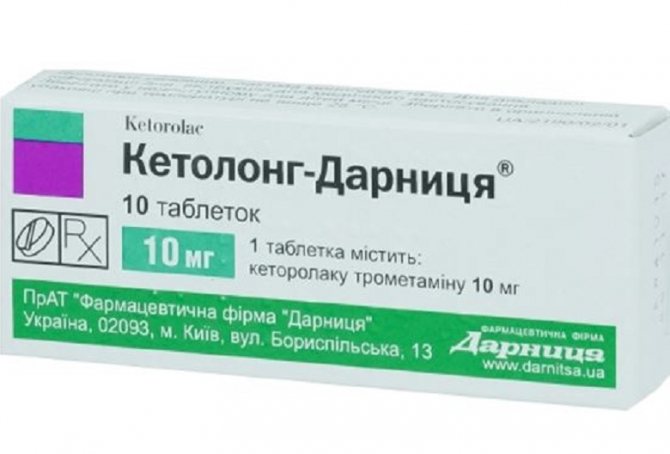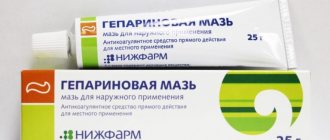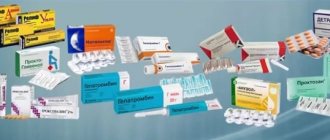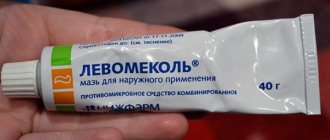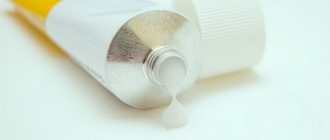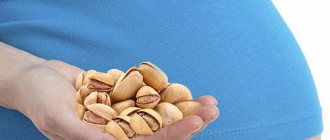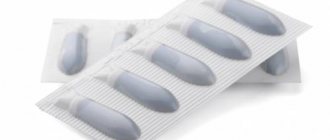Description of the drug
Heparin ointment is a local remedy that affects metabolic processes in tissues and blood clotting. It has an anticoagulant, anti-inflammatory, analgesic effect. It is successfully used in proctology to treat painful symptoms and prevent the formation of hemorrhoids.
Heparin ointment for hemorrhoids has a powerful antiseptic effect and is used to relieve symptoms and treat the disease
The drug is produced in the form of a white ointment with a gel structure, practically odorless. Packaged in standard factory tubes of 10 g and 25 g. Stored at room temperature, in a dry and dark place, for 3 years. Available without a prescription in all pharmacies.
The drug is a combination drug containing three active ingredients:
- sodium heparin – 100 units per 1 g ointment;
- benzocaine – 0.04 g;
- benzyl ester of nicotinic acid (benzyl nicotinate) – 0.0008 g.
An ointment substance in an amount of up to 25 g is used as a base. All components of the ointment actively interact with each other, quickly eliminating the painful symptoms of hemorrhoids.
Heparin ointment for hemorrhoids is considered one of the most effective antihemorrhoidal agents in the treatment of both chronic and acute pathological conditions. Approved for use at almost any age, but only as prescribed by a doctor.
Using ointment after hemorrhoid surgery
After hemorrhoid surgery, various complications may occur in the form of bleeding or pain. In this case, special anti-inflammatory ointments are prescribed.
Complications after surgery
Quite often after surgery complications such as:
- narrowing of the anus;
- pain syndrome;
- bleeding;
- the appearance of a fistula;
- suppuration.
It often happens that after surgery a patient is afraid of pain, and this forces him to restrain himself, postponing going to the toilet. Subsequently, constipation may reappear. In the postoperative period, feces can damage wounds that have not yet completely healed. Therefore, on the first day, it is advisable to completely give up food and fast so that the urge to go to the toilet does not occur. In the following days, it is important to adhere to proper nutrition, which eliminates the occurrence of diarrhea, constipation and flatulence, and bowel movements are more gentle. Also, for complications of hemorrhoids, various anti-inflammatory drugs, for example, ointments, suppositories and gels, which relieve inflammation, reduce pain and help soften stool, help well. It is good to use cool baths when blood and pain appear in the postoperative period. Cold water constricts blood vessels and thereby stops bleeding. Instead of a bath, you can use a shower by directing a cool stream of water to the anal area. After the procedure, you can use pain-relieving suppositories or ointments.
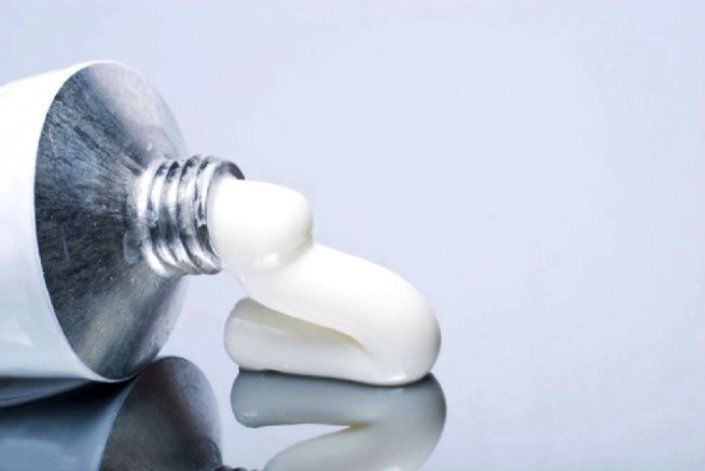
Ointments to relieve inflammation
So, what ointment should be applied to inflamed hemorrhoids, as well as the area after surgery? For complications of hemorrhoids, it is best to use anti-inflammatory, hemostatic and analgesic ointments, which should be applied to the inflamed area. It is worth paying attention to the fact that in some cases the use of ointments can last up to a month, and sometimes more. So, what drugs should be chosen for the treatment of hemorrhoids in the postoperative period:
- heparin ointment;
- Troxevasin;
- Vishnevsky;
- Posterizin;
- Proctosan;
- Relief;
- Fleming
- Hepatrombin;
- Levomekol;
- Ichthyol.
These drugs quickly relieve swelling, stop inflammatory processes, and also promote tissue regeneration. They should be used as prescribed by a doctor, who can recommend treatment based on a specific case.
How to use the ointment
In order for hemorrhoids to heal much better and faster after surgery, it is necessary to use healing agents correctly. Before applying the ointment, it is advisable to empty your intestines. After this, you need to thoroughly wash with soap and water and dry the anus. Then lie on your side and lubricate the inflamed area with an anesthetic. The product must be used for a month, until the wounds are completely healed. Many doctors also prescribe medicinal suppositories for quick healing. After surgery, blood may appear in the first days after hemorrhoid truncation. In this case, hemostatic agents and healing agents should be used. In some cases, patients begin to self-medicate using traditional recipes without seeing the full picture of the problem and thereby complicating their problem. Therefore, if bleeding does not stop for a long time, then you should definitely consult a doctor for advice and help.
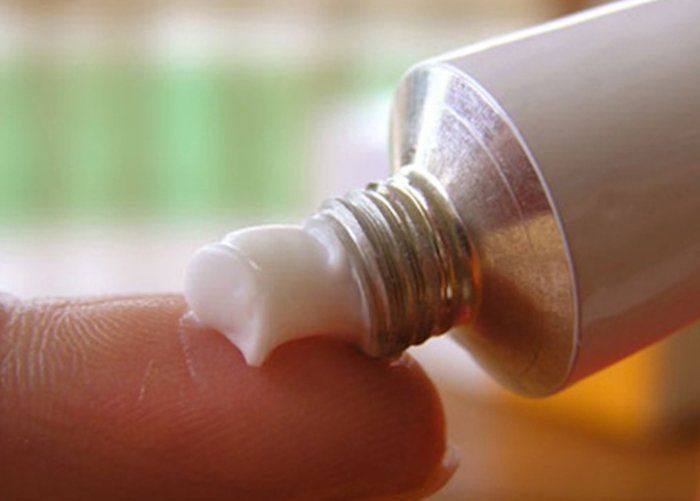
Diet and regimen after surgery
After surgery, in order for hemorrhoids to heal much faster and to avoid any complications, it is necessary to adhere to a special diet. It is necessary for good functioning of the intestines and digestive system. On the first day after surgery, a fasting diet is recommended. After this, it is necessary to eat such food so that the stool is soft and bowel movements occur without any problems. Then the inner walls of the intestines will not be irritated, and therefore, unhealed wounds will not be irritated. It is important to drink a fairly large amount of water, approximately 1.5-2 liters per day. In order not to provoke any kind of complications, you need to avoid spicy, salty and fatty foods. If, however, problems with constipation begin, then you should include vegetable oil in your diet or drink a glass of whey on an empty stomach. This will improve bowel function.
Hemorrhoids require you to follow a special daily routine. For example, it is recommended to divide meals into several meals. Most often, nutritionists and doctors recommend six divided meals a day. In this case, the portions should not be very large. If before the operation your lifestyle was mainly sedentary, which caused stagnation of blood in the vena cava, then in order to avoid complications you should move as much as possible. This will help improve blood circulation in the pelvis and eliminate the formation of stagnation.
Therapeutic effect of the ointment
Heparin ointment is a direct anticoagulant, that is, it prevents blood clotting and the subsequent formation of blood clots. It is this effect that is important in the treatment of hemorrhoids. The main manifestation of the disease is hemorrhoidal nodes, formed as a result of blood stagnation and thrombosis of the vessels of the rectum. They become inflamed during an exacerbation and cause pain during bowel movements, burning, itching, and sometimes bleeding.
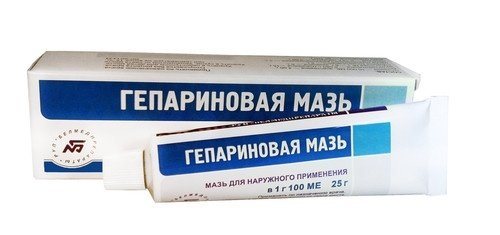
The drug is one of the most accessible and effective for external hemorrhoids, as well as for its internal and combined forms.
Each component of the drug has a separate symptomatic effect:
- heparin as an active substance prevents blood clotting and the formation of blood clots, and also helps relieve swelling and resolve existing nodes;
- benzocaine acts as an anesthetic, anesthetizing the inflamed area, relieving unpleasant and uncomfortable sensations;
- benzyl nicotinate dilates blood vessels, normalizing local blood flow, promoting rapid penetration and absorption of heparin.
How to use the ointment
To ensure faster and better recovery after surgery, local remedies should be used correctly. After surgery to remove hemorrhoids, ointment can only be applied after thoroughly cleaning the anus. Before this, it is very advisable to empty your intestines.
Treatment of hemorrhoids after surgery with ointment can be carried out in several ways:
- soak a gauze pad with the product and apply it to problem areas;
- squeeze a small amount of the drug onto your fingers and apply it to the corresponding area with light movements, while it is very important to avoid strong pressure and rubbing;
- Using a special applicator (it is usually found in the box along with the tube), introduce the ointment into the rectum; this method is used for internal hemorrhoids.
The affected areas should be treated with ointment 2 or 3 times a day. The course of therapy usually lasts at least 2 weeks. The method of use and duration of treatment with a particular drug may vary. Information on how to use it correctly can be found in the instructions or obtained from your doctor.
Indications and contraindications
Does Heparin Ointment Help with Hemorrhoids? Of course, it helps and is quite effective, because one of its main functions is to prevent blood clots. Namely, thrombosis of the vessels of the rectum causes hemorrhoidal disease.
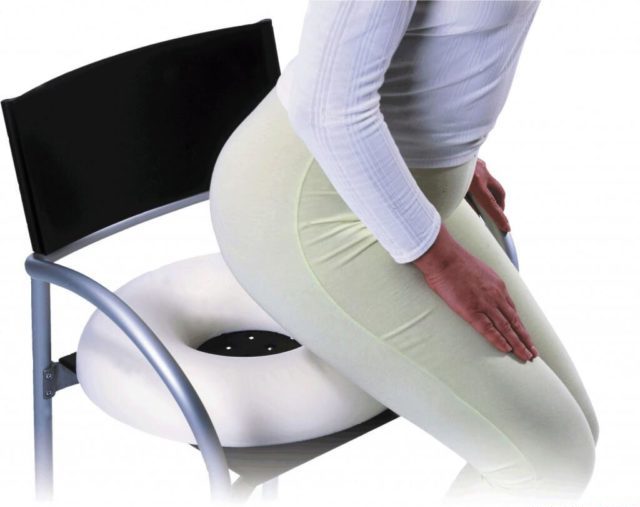
Used for inflammatory processes that occur in hemorrhoidal cones and thrombophlebitis
The spectrum of action of the ointment is quite extensive and includes the following pathological conditions:
- chronic and acute forms of external hemorrhoids;
- exacerbation of internal hemorrhoids;
- inflammation of hemorrhoidal cones;
- exacerbation of pathologies of the anus after childbirth;
- superficial thrombophlebitis (inflammation and thrombosis of the venous wall) of various locations;
- post-injection phlebitis;
- trophic ulcers of the extremities;
- elephantiasis (elephantiasis);
- mastitis;
- subcutaneous hematomas;
- bruises, injuries to muscle and joint tissue;
- local superficial swelling;
- lymphangitis (inflammation of the lymphatic vessels).
Due to its high bioavailability, the drug is used as first aid for the mentioned diseases, and is also prescribed as part of complex therapy for various pathologies. For hemorrhoids, it is used as a local therapeutic and prophylactic agent.
Heparin ointment is approved for use in almost any clinical situation associated with stagnation of blood in the tissues. There are no age restrictions either. But, like any medical drug, there are contraindications.
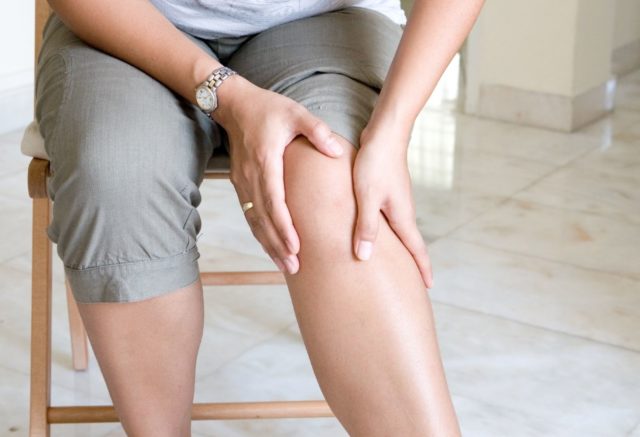
When treating skin diseases, it is simply rubbed into the affected area.
It is strictly forbidden to prescribe it for:
- hypersensitivity to ingredients;
- ulcerative-necrotic lesions of the skin;
- necrosis of the tissue surface;
- violation of skin integrity;
- open wounds and abrasions.
Due to its anticoagulant effect, heparin is used with extreme caution in the presence of:
- bleeding of various locations;
- history of blood clotting problems;
- thrombocytopenia (increased bleeding).
The toxicity of the drug is quite low, it does not have a strong negative effect on the body as a whole. Well tolerated by patients, with the rare exception of local allergic reactions. The appropriateness of use is determined by the attending physician; self-medication is not acceptable.
Ointments after surgery
Treatment of hemorrhoids at home after surgery often includes the use of ointments. Such drugs should accelerate tissue healing processes and have anti-inflammatory, antimicrobial, and hemostatic effects. There are also anesthetic ointments that, acting locally, quickly relieve pain. To prevent recurrence of hemorrhoids, agents that have a venotonic effect can be used.
The following ointments are most often prescribed after surgery for hemorrhoids:
- Heparin ointment. It improves blood flow, relieves inflammation, and relieves swelling. The product also contains a local anesthetic, which reduces pain.
- Troxevasin. This ointment not only relieves pain, relieves inflammation and eliminates swelling, but also increases the strength and tone of blood vessels, strengthens capillaries and reduces their permeability.
- Vishnevsky ointment. Inexpensive, but at the same time quite effective drug. It contains castor oil, xeroform, and birch tar. These components accelerate regeneration processes, relieve inflammation, eliminate swelling and improve the general condition of the anal area.
- Posterized. The medication stimulates local immunity, eliminates inflammation, and heals damaged tissue. It is safe, so it can be prescribed even to children, nursing and pregnant women.
- Proctosan. Bismuth, which is part of it, dries tissues, removes swelling and redness, and helps stop bleeding. This product is also a fairly effective antipruritic and analgesic ointment, reduces the risk of infection of wounds, and accelerates their healing.
- Aurobin. A combined drug that promotes rapid tissue healing, prevents the development of infections, relieves inflammation, swelling and pain. The ointment is also a local anesthetic.
- Bezornil. The medication has a pronounced decongestant, antiseptic, anti-inflammatory, analgesic, and astringent effect. Effectively eliminates pain, bleeding, itching.
- Methyluracil. This is an effective anti-inflammatory and healing agent. It also stimulates local immunity, prevents the development of infectious processes, and improves cellular nutrition.
- Proctosedyl. A multicomponent drug with a wide spectrum of action. Ointment after surgery for hemorrhoids will help reduce pain and itching, relieve inflammation, speed up the healing of wounds, and prevent their infection. It will also improve the tone of blood vessels and strengthen their walls.
- Levomekol. The medication does an excellent job of eliminating pain, fighting purulent infections and inflammatory processes.
- Hepatrombin. It has a pronounced analgesic and anti-inflammatory effect, relieves swelling, eliminates itching, and improves blood circulation.
- Ichthyol ointment. This is a disinfectant and analgesic drug that is prescribed for a variety of ailments. It also helps relieve inflammation and improve tissue healing.
- Relief. The basis of the ointment is natural ingredients. They effectively cope with postoperative consequences - they activate regenerative processes, relieve inflammation and pain, and eliminate swelling. Suitable for pregnant women, children, and breastfeeding women.
Heparin ointment for hemorrhoids - reviews
Heparin-based ointment is available in many home medicine cabinets. It saves not only with bruises and hematomas, but is also an indispensable first aid remedy for exacerbation of hemorrhoidal disease. Many patients respond positively to this life-saving drug due to its high effectiveness and availability.
Marina, 33 years old: “Heparin is the main healer in the house. I use it to heal wounds and abrasions on my restless children. I use it myself periodically to treat recurrent hemorrhoids. It helps almost immediately after the first compress. To consolidate the result, I apply it for several days in a row. A very good remedy!”
Ivan, 47 years old: “I have been suffering from hemorrhoids for many years, I have tried many folk and pharmacy medicines. I opted for Heparin ointment - a cheap, and most importantly, good medicine. I recommend it to everyone who doesn’t know how to save themselves from this unpleasant disease.”
Lyudmila, 63 years old: “Heparin ointment for hemorrhoids – I was very pleased with the price. I bought it for my daughter after a difficult birth on the recommendation of a gynecologist friend. Two days passed after the start of treatment - she felt much better. And we didn’t notice any side effects for her or the baby. Good ointment."
Use during pregnancy
Heparin ointment during pregnancy is used only after consultation with your doctor.
Pregnancy is a special period in a woman’s life. The growing fetus puts pressure on the organs, preventing feces from moving normally through the intestines. Hemorrhoidal bumps appear. At this time, taking any medications should be done with caution, because we are talking about the health of mother and baby.
Depending on the stage of pregnancy, the ointment can be used before and after childbirth. But it is imperative to consult a clinic. The drug has minimal side effects. Gives excellent and fast results.
The method of application is the same as described above. If undesirable manifestations occur, an immediate visit to your doctor is required.
The real scourge of our time, hemorrhoids, requires treatment in the early stages. Until it comes to complications and surgical intervention, you can use external medications. Heparin ointment is a product that has proven itself on the positive side. Efficiency, ease of use, affordable prices, short course of administration - the advantages of this ointment are obvious.
THERE ARE CONTRAINDICATIONS CONSULTATION WITH YOUR DOCTOR IS REQUIRED
Author of the article Alexey Alexandrovich Egorov, proctologist
Procto-Glivenol ointment – a complex preparation
This drug is popular in rehabilitation, as it has a combined antihemorrhoidal effect. Tribenoside included in the ointment:
- Helps reduce capillary permeability.
- Improves the tone of the heart muscle.
- It has an antagonistic effect on endogenous substances that act as mediators and increase pain and inflammation.
- Reduces itching in the postoperative area.
This ointment for healing hemorrhoids during the rehabilitation period is considered one of the best in its price segment. The drug is applied rectally 1-2 times a day, depending on the course of the recovery process. The drug is used in the treatment of internal and external hemorrhoids; the duration of the course of therapy is determined by the doctor.
Which drugs are most effective?
After removing hemorrhoids, you need to take medications that have:
- Painkillers.
- Anesthetic.
- Anti-inflammatory.
- Antimicrobial action.
Levomekol ointment, which promotes wound healing and reduces pain, shows good effectiveness. Drugs that can also be used:
- Ketolong.
- Ketorol.
- Ketanov.
- Procto-Glivenol.
- Nemesil.
- Heparin ointment.
Ketorol and Ketanov for pain relief
These analgesics are intended to reduce pain, including during the postoperative period. Symptomatic therapy should not last more than 5 days, the daily dosage for Ketorol is up to 30 mg.
The mechanism of action of Ketanov is based on inhibition of the activity of COX, an enzyme formed as a result of metabolic processes involving arachidonic acid. The maximum daily dosage for the drug is up to 90 mg, after 65 years it is reduced to 60 mg. This drug is used for exacerbation and severe pain for no longer than 2 days. Note that painkillers are used only in case of severe pain; at other times, complex drugs with a wide spectrum of action are sufficient.
Now let's see what pain-relieving ointments after surgery will help reduce pain and eliminate inflammation.
